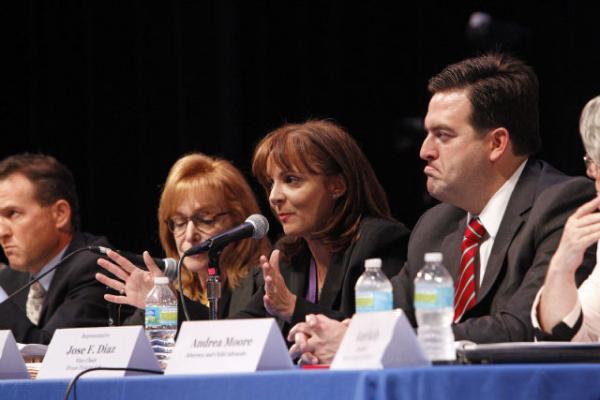
With lawmakers from Broward, Palm Beach and Miami-Dade counties on hand,hundreds of people turned out Tuesday night for a town-hall meeting about an epidemic of deaths in recent months that has rocked the state”s child-welfare system.
Sen. Eleanor Sobel, a Hollywood Democrat and chairwoman of the Senate Children, Families and Elder Affairs Committee, had called the meeting before The Miami Herald reported Sunday that the death toll had climbed to 20 — all children whose families were already known to the state Department of Children and Families.
Also attending the meeting at the Broward College South Campus was DCF Interim Secretary Esther Jacobo, who took the reins of the troubled agency July 18, following the resignation of former secretary David Wilkins. Seventeen of the children had already died, and the others perished shortly thereafter.
“One reason things aren’t changing fast enough is there”s no anger, there”s no outrage in this room,” charged Pat McCabe, a foster parent and Guardian ad Litem. “Unfortunately, the people that would be outraged and angered are dead.”
McCabe said he”d gotten involved in child-welfare issues after the disappearance of Rilya Wilson, who was 4 years old when she vanished from her foster home in 2000. He said he was representing Rilya”s ghost in demanding that the child -welfare system be held accountable.
“We”re all outraged, but we”re trying to keep calm about it,” replied Sobel, who had urged attendees to avoid finger-pointing and look for solutions. “Is anybody here not outraged? We”re outraged and we”re not going to take it.”
Other panelists included Kurt Kelly, president of Florida’s Coalition for Children, the association of community-based care organizations that deliver regional children”s services, attorney Andrea Moore and James Walker, the assistant program administrator for child-protective investigations at the Broward Sheriff’s Office.
Jacobo gave a rundown of her major actions as interim secretary, starting with a directive to review all the deaths during 2013 of children known to the department. She said the Casey Family Programs would critique the findings. She also said she was working to get the statewide child information network fully operational.
“I know from being in the field that the more eyes on a child and the more people making decisions, the better off we are and the better decisions that we make,” Jacobo said.
She also asked the child-welfare workers present — making up most of the audience — to stand. “None of these people wants a child to die,” she said. “They are looking for the answers as much as you are.”
Much of the discussion at the meeting, which was webcast across the state by The Florida Channel, focused on DCF”s elimination of certain checks and balances. Former Democratic state Sen. Nan Rich, who is now running for governor, pointed to the removal of second-party reviews of high-risk children”s cases, a move that is now on hold.
“I think this (DCF) administration has ended up with fewer eyes on children,” Rich said.
Christina Spudeas, executive director of Florida”s Children First, pointed to a 72 percent reduction in quality-assurance positions since 2008. She also said records showed that some of the community-based care agencies had contracted with each other to do second-party reviews.
“The resolution of lawsuits against community-based providers for deaths and serious injuries should also be made available for public scrutiny,” Spudeas said.
But Kelly said there was “quite a lot of oversight” at the community-based care organizations he represents. “If there”s been a shining success, it’s the community-based care model,” he said.
Attorney Howard Talenfeld, also of Florida”s Children First, said the Legislature had approved cutting the 76 quality-assurance positions three years ago. “The Legislature needs to restore those positions,” he said. “DCF needs the eyes and ears to monitor what”s happening.”
Of the 20 recent children”s deaths, Talenfeld said, many fell through the cracks due to poor communication by child welfare workers.

